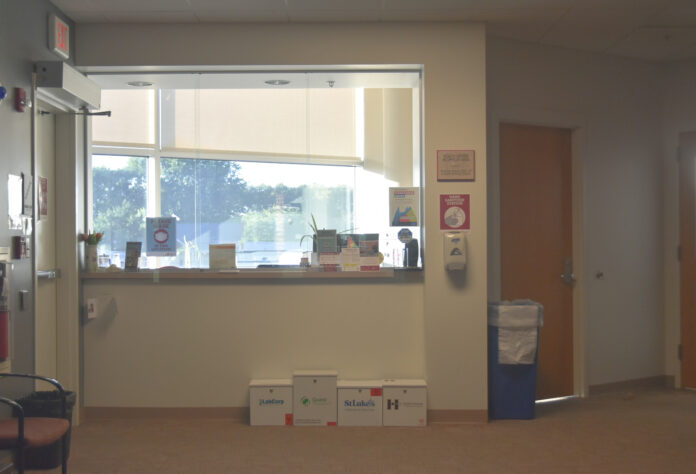
The Monkeypox outbreak has made its way onto Muhlenberg’s campus and was reported on Sept. 7 in an email from Dean of Students Allison Williams. “A person who was on campus last week self-reported a recent positive test for monkeypox. The individual is not a student and does not live on campus. The person is now in isolation,” stated Williams in the message. As cases of monkeypox increase on the national and global scale, the College is implementing measures to cope with the potential spread of the virus among the student body.
Monkeypox is an infectious disease which results in, “blisters on the skin filled with pus and fluid. These blisters may be localized in one area or dispersed around the body. They are often very painful. Other symptoms may include fever, headache, muscle aches, swollen lymph nodes and fatigue,” according to Director and Associate Professor of Public Health Chrysan Cronin, Ph.D.
There are a wide array of misunderstandings surrounding the spread of the virus; Cronin noted that, “there is a common misconception that Monkeypox can only be spread through close personal contact. While this is one way to transmit the disease, we know that contact with saliva… can also spread the disease. In addition, the virus can live on inanimate objects such as sheets, towels, and clothing and can spread if these objects are shared with others.”
A widely-held belief that has taken hold as monkeypox has proliferated is that the disease is a sexually transmitted infection (STI). Cronin dispels this saying, “monkeypox is neither an STI or a ‘gay disease.’ When the first reports came out, the disease was predominantly seen in men who have sex with men. But as we know from experiencing other viral outbreaks, viruses are non-discriminatory and will infect whoever happens to be available. We need to be sure that people in positions of authority who communicate information about monkeypox give information that is correct.”
“monkeypox is neither an STI or a ‘gay disease.’ When the first reports came out, the disease was predominantly seen in men who have sex with men. But as we know from experiencing other viral outbreaks, viruses are non-discriminatory and will infect whoever happens to be available.”
In a conversation with The Weekly, Williams outlined Muhlenberg’s procedure for potential cases among the student population. Williams stated that, “students who test positive for monkeypox must isolate away from campus from the onset of symptoms until the rash has healed, all scabs have fallen off and a fresh layer of skin has formed. This is typically a 2-4 week time period.” The process of contact tracing was also noted. “Students who have been identified as having a direct known exposure to monkeypox will be given information about symptom monitoring, when and how to seek testing and information about vaccination,” stated Williams. However, if a student who tests positive is unable to isolate off campus, on-campus isolation housing will be provided.
Currently, access to the vaccine for monkeypox is operating on a limited roll out. Cronin emphasized this stating, “Individuals who are most vulnerable to getting and transmitting the disease have priority. The vaccine is so scarce that the FDA has approved dividing up a single dose into five separate individual doses so that more people can get immunized.” The monkeypox vaccine, however, is effective after exposure, according to Cronin. “It can be effective even after exposure so if you know you have been exposed, you should get the vaccine immediately.”
“It can be effective even after exposure so if you know you have been exposed, you should get the vaccine immediately.”
The College has historically provided vaccination clinics for illnesses such as influenza and COVID-19. In response to an inquiry about whether Muhlenberg would provide similar services for monkeypox, Williams said, “as the monkeypox vaccine becomes more available, we will notify our community of vaccination clinics occurring both locally and on our campus. This is an important issue for college students, so we will be vigilantly working to offer these clinics as soon as it is possible to do so.”
Muhlenberg’s student body has mixed opinions regarding the College’s response to the virus. “It is important to consider the extra precautions that… Muhlenberg College could institute to minimize the spread of the disease. For example, ensuring that there are proper disinfectant cleaning supplies in all college classrooms and spaces will ensure that students and staff can wipe down surfaces before and after classes, events, or other sessions… monkeypox exposures can be mitigated by proper sanitation efforts and continued educational outreach,” said Nour Yousry ‘23.
While she agreed with the College’s strict isolation policy, Esther Klinger ‘25 illustrated some distress surrounding the severity of the potential circulation of the virus on Muhlenberg’s campus, “It is very stressful to have to take a 2-4 week leave of absence–I fall behind after missing just one class.” Klinger also illustrated her thoughts on Muhlenberg’s promise of increased sanitation saying, “the College also stated that they would routinely clean showers, toilets and sinks, but honestly I don’t think the showers in my residence hall have been cleaned in weeks. Based off that and how poorly enforced the COVID masking [and] close-contact policies were last year, I don’t think the College is going to be very strict in enforcing the monkeypox policies it has supposedly put in place.”
Katie is a Media & Communication and Political Science double major in the class of 2024. When she's not working on the paper you can find her blasting Taylor Swift, reading Jane Austen, or crying over Little Women (2019).






















